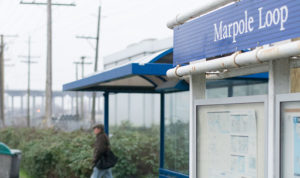
Trialed and true: More electric buses enroute
TransLink wants to cut greenhouse grass emissions
Reported by Jennifer Wilson
TransLink will experiment with four fully electric buses in south Vancouver as part of the company’s plans to cut greenhouse-gas emissions.
Two models of electric bus will run along Marine Drive next year, a move that follows TransLink’s first electric-bus trial in 2017.
The buses will drive the 100 route from the 22nd Street Station to the Marpole Loop, where the company will also place an electric charging station for the buses.

TransLink is not the only agency planning for Vancouver’s electric future. The park board recently approved new public charging stations, for electric cars, at two South Vancouver locations, Dunbar and Killarney community centres.
Dale Bracewell, Vancouver city manager for transportation planning, said that the city, as a whole, is moving forward with its plans to cut fossil-fuel emissions and road congestion. Vancouver expects to have 1 million more inhabitants by 2040 and Bracewell said there is more work to be done to accommodate this growth.
“We’re still shaping the city we want,” he said.
Vancouver today has the largest fleet of electric municipal vehicles in Canada. The city’s 2020 target, that 50 per cent of citywide travel occur by bicycle, foot or public transit, has already been met.
Bracewell said that although green options for private vehicles addressed air pollution, better transit options were key to reducing congestion in the city,
“As cars already are shifting toward electric, and later on to driverless, moving people in cars is still moving people in a metal box and a big part of transportation planning is dealing with space.”
The president of the Vancouver Electric Vehicle Association (VEVA) Bruce Sharpe said he welcomed TransLink’s move towards electric buses. VEVA showcased an electric bus at their 2018 EV expo,
“We’ve informally encouraged TransLink to lean towards pure electric versus hybrids,” Sharpe said.
The electric battery buses will add to TransLink’s fleet of almost 1,600, a third of which are already electric trolleys or electric hybrids. The company’s 10-year plan aims to maintain the current carbon footprint even as the city population and the bus fleet grow over the next decade.
Two Nova and two Xcelsior battery electric buses have been selected by TransLink for the 2019 trial run. Both models are approximately the same size and seat around 40 people. The Nova, however, has a shorter battery life, with a 40-kilometre range on a full charge, which takes about two hours. The Xcelsior can run up to 250 kilometres after charging overnight.
A recent emissions report from TransLink shows that the current electric hybrids produce 20 per cent fewer carbon emissions than the diesel buses, which make up almost half of the bus fleet. The experimental electric buses, however, will produce zero emissions and do not need the trolley wire system to run.

Comments are closed.